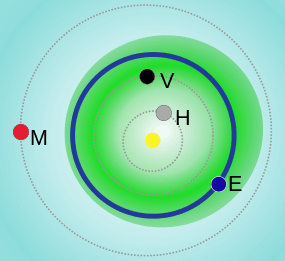2001 AV43
| Discovery[1] | |
|---|---|
| Discovered by | Lincoln Laboratory ETS (now LINEAR) |
| Discovery site | Socorro, New Mexico, USA |
| Discovery date | January 5, 2001 |
| Designations | |
| MPC designation | 2001 AV43 |
| MPO 277116 | |
Apollo  NEO | |
| Orbital characteristics[2] | |
| Epoch 13 January 2016 (JD 2457400.5) | |
| Uncertainty parameter 0 | |
| Observation arc |
4834 days (13.23 yr) 13.23 yr |
| Aphelion | 1.59287154 AU (238.290191 Gm) |
| Perihelion | 0.97446141 AU (145.777352 Gm) |
| 1.28366647 AU (192.033771 Gm) | |
| Eccentricity | 0.24087648 |
|
1.45 yr (531.22 d) 1.45 yr | |
Average orbital speed | 25.9023522 km/s |
| 162.84530° | |
| 0° 40m 39.654s /day | |
| Inclination | 0.20179585° |
| 20.552667° | |
| 51.227366° | |
| Earth MOID | 0.00166475 AU (249,043 km) |
| Jupiter MOID | 3.66548 AU (548.348 Gm) |
| Physical characteristics | |
| Dimensions | 35–75 m[3] |
| 0.1701 h (0.00709 d) | |
| 24.6[2] | |
|
| |
2001 AV43 is a small asteroid that is a Near-Earth object and an Apollo asteroid.
Orbit
The orbit of 2001 AV43 has been well-established with over 13 years of observations. The asteroid was discovered January 5, 2001, but precovery images taken in August 2000 were found after its discovery. The orbit of 2001 AV43 is predicted to bring the asteroid within 0.002094 AU (313,300 km; 194,600 mi) of Earth on November 11, 2029.[2] For comparison, the distance to the Moon is about 0.0026 AU (384,400 km). The asteroid approached 2.7 lunar distances from the Earth on November 18, 2013, and the angle of approach made it a good target for radar observations.[4]
The Jupiter Tisserand invariant, used to distinguish different kinds of orbits, is 5.017.[2] The orbit has a very low inclination of about 0.2 degrees.
Physical characteristics
An attempt to measure the rotation period using radar resulted in 0.17 hours, but this result is considered to be incomplete or inconclusive.[2]
References
- ↑ "2001 AV43". Minor Planet Center. 2013-10-28.
- 1 2 3 4 5 "JPL Small-Body Database Browser: 2001 AV43" (last observation: 2013-11-24; arc: 4834 days). Jet Propulsion Laboratory. Retrieved 30 March 2016.
- ↑ "ABSOLUTE MAGNITUDE (H)". NASA.
- ↑ Jim Borg (November 17, 2013). "Asteroid to make 'close' pass to Earth on Monday". Star Advertiser.
External links
- 2001 AV43 at the JPL Small-Body Database
